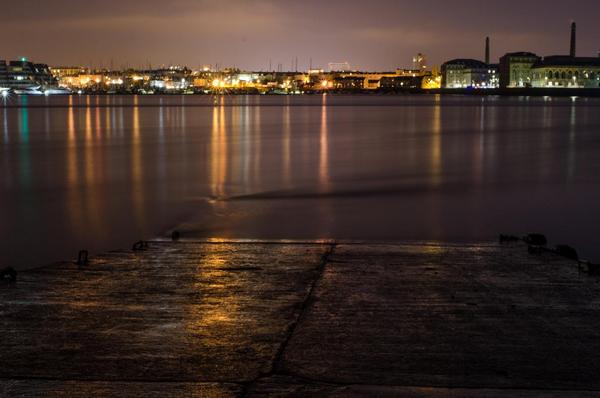Marine ecosystems can be changed by night-time artificial lighting according to new research published in the Royal Society journal Biology Letters. The results indicate that light pollution from coastal communities, shipping and offshore infrastructure could be changing the composition of marine invertebrate communities.
Researchers from the Universities of Exeter and Bangor used a raft in the Menai Strait to monitor how artificial light at night affects the settlement of marine invertebrates into new habitats. Light is an important cue which guides the larvae of marine invertebrates as they search for suitable habitats to settle, grow and reproduce.
The researchers found that artificial light both suppressed and encouraged colonisation by several species common to British coasts, including sea squirts and keel worms. These species are often referred to as fouling invertebrates as they adhere to manmade structures sometimes causing problems in marinas, dockyards and aquaculture facilities.
 |
|
Marine ecosystems can be changed by night-time artificial lighting. (Photo Credit: Tom Davies, University of Exeter) |
The results indicate that artificial light - increasingly used in coastal environments - could encourage unwanted fouling in marinas and dockyards, but also alter the abundances of these species in the wider environment where they can provide important ecosystem services.
Coral larvae, for example, use light to identify optimum habitats to settle in and grow into reef building adult structures. As tropical waters tend to be clearer than UK waters artificial light can penetrate deeper and disrupt a wider range of organisms.
Dr. Tom Davies from the University of Exeter said: "We know that artificial light at night alters the behaviour of many marine animals but this is the first study to show that it can disrupt the development of ecological communities in the marine environment. Further research is urgently needed to assess what level of light can be considered 'safe' so that legislation can be put in place to minimise future light pollution from new and existing developments."
Dr. Stuart Jenkins of the School of Ocean Sciences at Bangor University said: "This is an important first step in developing understanding of the way artificial light may be affecting marine coastal assemblages. Our research showed that levels of artificial light, commonly found in urbanised and developed coastal areas, can have important effects on the development of communities inhabiting hard surfaces in shallow water."
Dr. Katherine Griffith, also from the School of Ocean Sciences, added: "With urbanisation on the increase, many coastal areas around the globe will become vulnerable to the effects of artificial light pollution. Therefore, further research on how artificial light may disrupt marine communities is vital if we are to mitigate these impacts."





 CN
TW
EN
CN
TW
EN






